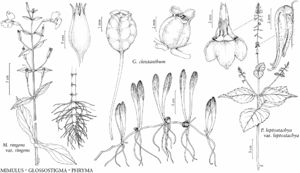Difference between revisions of "Phryma leptostachya var. leptostachya"
FNA>Volume Importer |
FNA>Volume Importer |
||
| Line 29: | Line 29: | ||
|elevation=10–1500 m. | |elevation=10–1500 m. | ||
|distribution=Man.;N.B.;Ont.;Que.;Ark.;Conn.;Del.;D.C.;Fla.;Ga.;Ill.;Ind.;Iowa;Kans.;Ky.;La.;Maine;Md.;Mass.;Mich.;Minn.;Miss.;Mo.;Nebr.;N.H.;N.J.;N.Y.;N.C.;N.Dak.;Ohio;Okla.;Pa.;R.I.;S.C.;S.Dak.;Tenn.;Tex.;Vt.;Va.;W.Va.;Wis.;Wyo. | |distribution=Man.;N.B.;Ont.;Que.;Ark.;Conn.;Del.;D.C.;Fla.;Ga.;Ill.;Ind.;Iowa;Kans.;Ky.;La.;Maine;Md.;Mass.;Mich.;Minn.;Miss.;Mo.;Nebr.;N.H.;N.J.;N.Y.;N.C.;N.Dak.;Ohio;Okla.;Pa.;R.I.;S.C.;S.Dak.;Tenn.;Tex.;Vt.;Va.;W.Va.;Wis.;Wyo. | ||
| − | |discussion=<p>Variety leptostachya ranges from eastern North America to easternmost Wyoming and eastern Texas and Manitoba. Phryma had previously been reported as occurring as a garden waif in central California (C. Best et al. 1996); it has since been rejected as being naturalized in that state (http://ucjeps.berkeley.edu/cgi-bin/get_cpn.pl?37935). Fruit dispersal is presumably via animals, with attachment facilitated by the uncinate lobes of the persistent calyx (P. D. Cantino 2004).</p> | + | |discussion=<p>Variety leptostachya ranges from eastern North America to easternmost Wyoming and eastern Texas and Manitoba. <i>Phryma</i> had previously been reported as occurring as a garden waif in central California (C. Best et al. 1996); it has since been rejected as being naturalized in that state (http://ucjeps.berkeley.edu/cgi-bin/get_cpn.pl?37935). Fruit dispersal is presumably via animals, with attachment facilitated by the uncinate lobes of the persistent calyx (P. D. Cantino 2004).</p> |
|tables= | |tables= | ||
|references= | |references= | ||
| Line 53: | Line 53: | ||
|publication year= | |publication year= | ||
|special status=Selected by author to be illustrated;Endemic | |special status=Selected by author to be illustrated;Endemic | ||
| − | |source xml=https://jpend@bitbucket.org/aafc-mbb/fna-data-curation.git/src/ | + | |source xml=https://jpend@bitbucket.org/aafc-mbb/fna-data-curation.git/src/8f726806613d60c220dc4493de13607dd3150896/coarse_grained_fna_xml/V17/V17_1271.xml |
|genus=Phryma | |genus=Phryma | ||
|species=Phryma leptostachya | |species=Phryma leptostachya | ||
Revision as of 15:57, 18 September 2019
Stems reddish, sometimes green, simple or branched, 4–10 dm, swollen distal to each node, some hairs glandular. Leaves: petiole 2–5 cm; blade ovate to ovate-lanceolate, 5–16 × 3–10 cm, base cuneate to truncate, apex acute to acuminate, surfaces glabrous or puberulent. Inflorescences: flowers opposite or subopposite; proximal bracts cordate, leaflike, distal usually present, subulate, 1/3–1/2 distance between base of inflorescence and proximal flowers. Pedicels to 1 mm; bracteoles 3, persistent, subulate. Flowers: calyx green, 5–8 mm, glabrous, abaxial lobes 2, triangular, 0.1–0.5 mm, adaxial 3, subulate-uncinate and indurate in fruit, 2–3 mm; corolla glabrous externally, puberulent on abaxial lip at mouth, tube 8–12 mm, abaxial lobes white to lavender, 2–4 mm, apex rounded, adaxial lavender to purple, 2–4 mm, apex acute, usually emarginate; ovule 1; style slightly exserted, glabrous; stigma lobes unequal. Achenes strongly reflexed and appressed to infructescence axis, 3–4 mm. 2n = 28.
Phenology: Flowering May–Aug; fruiting Jul–Oct.
Habitat: Moist woods, edges of woods.
Elevation: 10–1500 m.
Distribution
Man., N.B., Ont., Que., Ark., Conn., Del., D.C., Fla., Ga., Ill., Ind., Iowa, Kans., Ky., La., Maine, Md., Mass., Mich., Minn., Miss., Mo., Nebr., N.H., N.J., N.Y., N.C., N.Dak., Ohio, Okla., Pa., R.I., S.C., S.Dak., Tenn., Tex., Vt., Va., W.Va., Wis., Wyo.
Discussion
Variety leptostachya ranges from eastern North America to easternmost Wyoming and eastern Texas and Manitoba. Phryma had previously been reported as occurring as a garden waif in central California (C. Best et al. 1996); it has since been rejected as being naturalized in that state (http://ucjeps.berkeley.edu/cgi-bin/get_cpn.pl?37935). Fruit dispersal is presumably via animals, with attachment facilitated by the uncinate lobes of the persistent calyx (P. D. Cantino 2004).
Selected References
None.
